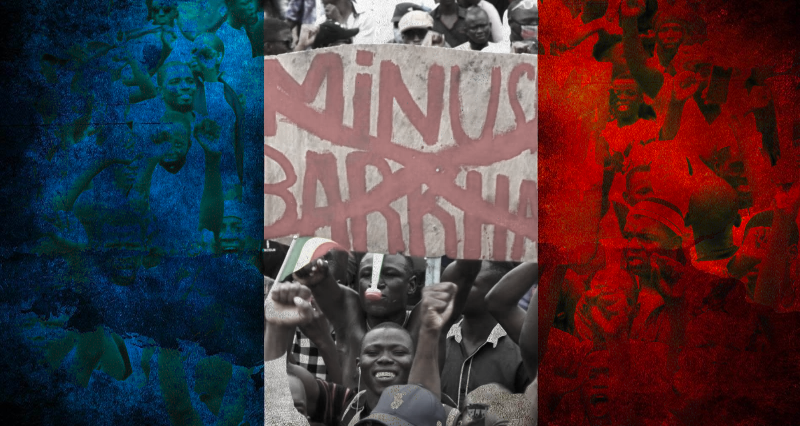By Adem Kılıç
Coup attempts to overthrow governments became more frequent than elections across Africa. Studies demonstrate that the African Continent is the most prone to coups in the world.
According to research conducted by the New York-based Council on Foreign Relations, there have been at least 200 coups and coup attempts on the African continent over the past 50 years. The data shows that the majority of these coups occurred in the Western region of the continent. Nigeria, Ivory Coast, Senegal, Mauritania, Mali, Niger, Ghana, Liberia, Burkina Faso, Benin, Togo and Guinea in the West African region, stand out as the primary countries prone to coups, exceeding 70% of the continent’s total.
In the wake of the fight for independence on the African continent in the early 1960s, people thought they might see an end to repression and exploitation. However, the colonial powers had granted African countries independence only on paper. These powers retained their presence and exploitation throughout the continent, both through colonization agreements and together with local collaborationist politicians.
The continuing effects of exploitation in the years following independence came with economic difficulties and inequality that persisted despite the continent’s rich reserve of natural resources. This became the main obstacle to the success of the national structures that had only come into being. However, the most brutal coups that occurred to countries involved in independence processes were organized, directly or indirectly, by the West. Western powers armed and financed coup leaders in order to obtain natural resources or oust leaders they ideologically opposed.
Global superpowers used intelligence agencies to infiltrate the politics and armies of various governments to finance military coups, and the regimes that came to power as a result were beholden to their former colonial exploiters once again.
Today, although these strategies are still being used, another strategy has developed that could be considered new. Under the pretext of terrorist organizations or separatist groups, coup processes are being carried out in order to justify troop deployment, occupation and control of administrative apparati. The latest examples of this were seen in some countries in Africa in a short period of just 15 months: Sudan and Guinea are examples.
Coup incentives and the forces behind them
But the times are changing. Governments across Africa are increasingly becoming aware of the folly and impasse of being subjected to the same world power before and after independence, and are now seeking alliances with other global powers in order to obtain some stability.
Many actors who want to take advantage of Africa’s strategic position and rich resources have begun to make serious investments into the continent over the past 20 years. The efforts of China, Russia and Turkey are becoming increasingly worrying to western countries, chiefly France, which wishes to maintain its colonial status.
China is currently the largest trading partner in Africa with an annual China-Africa trade exceeding $200 billion. According to the data of the American-based Rand Corporation, more than 10 thousand Chinese-possessed firms currently operate on the African continent. In addition, China has recently enhanced its military moves in Africa and established its first military base abroad in Africa.
Aside from China, Russia is currently the number one arms supplier in Africa. According to the 2021 SIPRI data, at least 35% of Africa’s total arms imports are covered by Russia. It is also well known that Russia is making efforts to establish military bases in 6 African countries, Sudan first and foremost. Russia is expanding its presence in several African countries, including Mali, which very recently was subject to a coup d’état.
Understanding the fact that their investments will not be permanent if they are not supported by political circles, these new actors are in much tighter contact with the military and bureaucratic elements of the countries in question. The opportunities offered by new actors seem to be much more attractive to these countries that wish to develop, compared to what France offers. Global actors such as Turkey are approaching these nations with win-win strategies to the supreme annoyance of the continent’s former occupiers.
The first fear of the Western world is that Africa will fall under the control of China and into the Russian sphere of influence. Secondly, they are afraid that under Turkish leadership, African countries turn into islamics entities. Approximately 800 million Muslims live in Africa with a total population of 1.5 billion people, and 27 of the 57 member countries of the Organization of Islamic Cooperation are located there. Conflicts between the Ottoman Empire and the West between 1500 and 1900 are an important part of the history of the region.
Today, 400-year-old historical relations and the religious unity between the Ottoman Empire and African countries offer great strategic advantages to modern day Turkey. In this context, Turkey-Africa relations have reached new heights with policies put in place in the 2000s and financial investments. This has proven to be a lucrative strategy, and with the gains it has offered, financial assistance through institutions such as the Red Crescent, TIKA, and the Yunus Emre Foundation were given. This situation undoubtedly bothers the West profoundly. Turkey’s slogans such as “a more just world is possible” and “the world is bigger than five” have a profound impact on African states and the Muslim peoples who have long been exploited.
Conclusion
In recent years, the political developments in many regions of Africa and the blooming effectiveness of actors such as China, Russia and Turkey are driving the interests of the West, especially France, into a dead end across Africa. The recent anti-French demonstrations in Mali and Burkina Faso are one indication of where things are heading.
On the other hand, if we consider the fact that France has held the national reserves of 14 African countries since 1961, and the fact that the French treasury obtains a huge amount of income from Africa, we will achieve a better understanding of the incentives of developments motivating the West.

















Leave a Reply